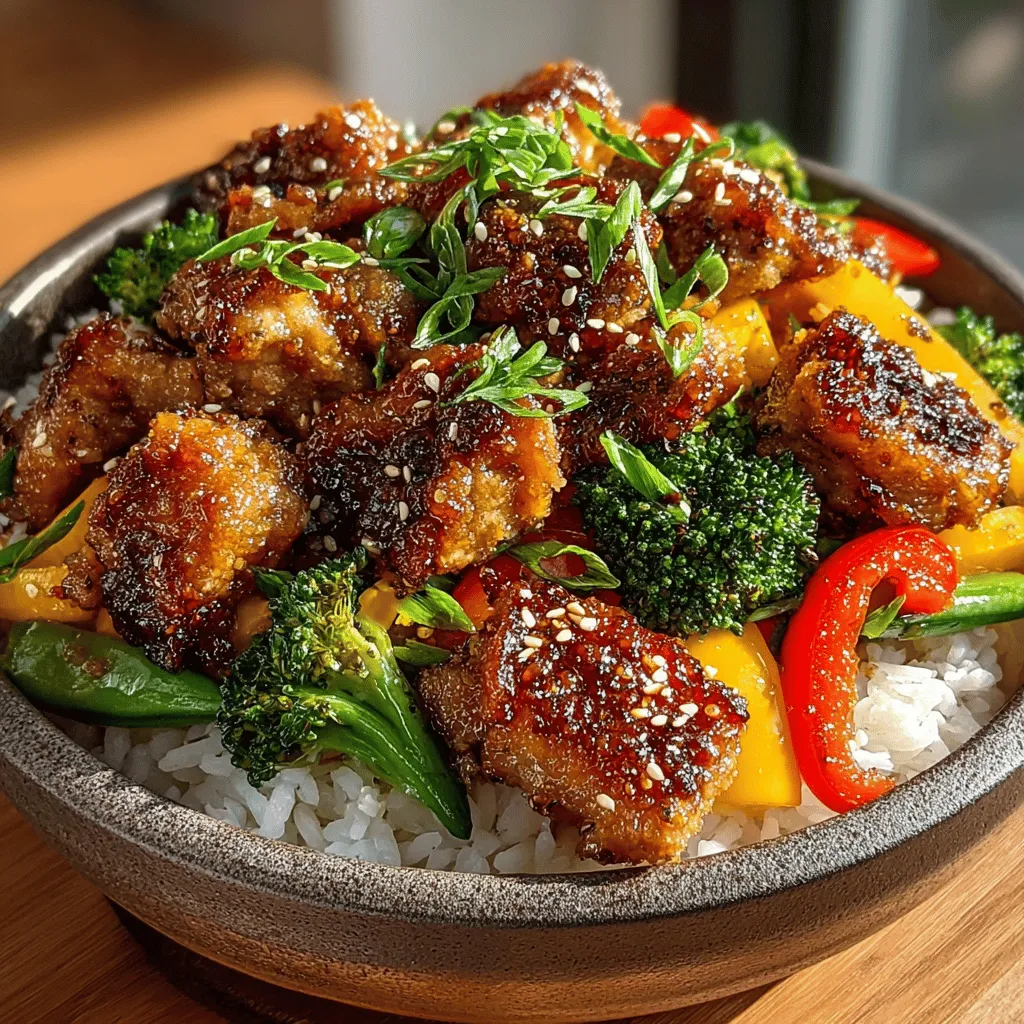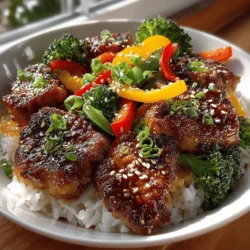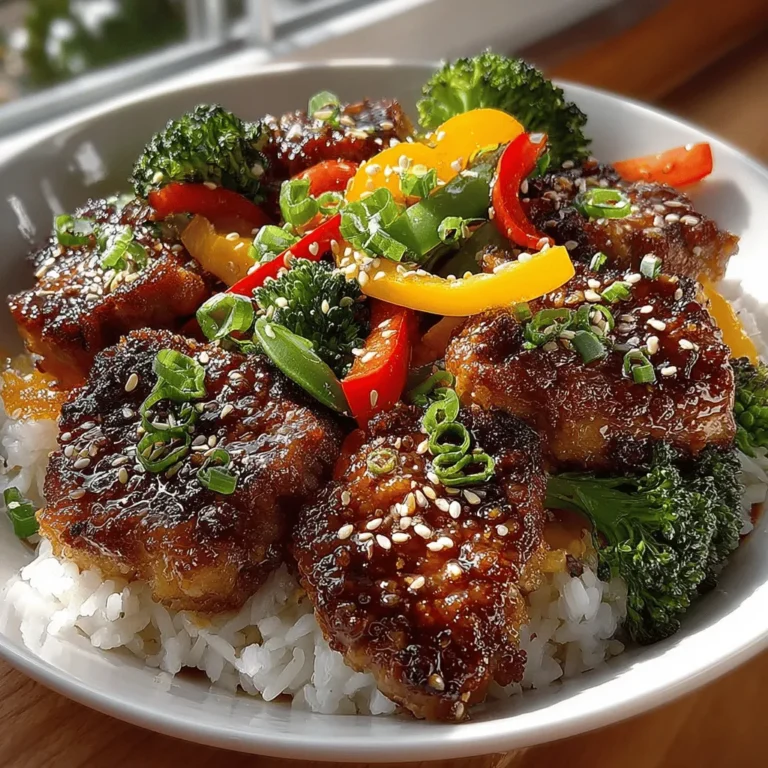Introduction
Explore the vibrant flavors of Asian cuisine with our Savory Teriyaki Chicken & Veggie Delight. This dish combines tender chicken thighs, fresh vegetables, and a rich teriyaki sauce, creating a wholesome meal that’s as nutritious as it is delicious. Perfect for busy weeknights, this recipe is quick to prepare and packed with flavor, making it a favorite among families and food enthusiasts alike. In this article, we’ll delve into every aspect of making this delightful dish, from ingredients to cooking techniques, ensuring you have all the information you need to recreate it in your own kitchen.
Ingredients
– 1 lb boneless, skinless chicken thighs
– 2 cups broccoli florets
– 1 cup bell peppers (red, yellow, or green), sliced
– 1 cup snap peas
– 1/4 cup teriyaki sauce (store-bought or homemade)
– 2 tablespoons vegetable oil
– 2 cloves garlic, minced
– 1 teaspoon ginger, minced
– Cooked rice or quinoa, for serving
– Sesame seeds (optional, for garnish)
– Green onions, sliced (optional, for garnish)
Instructions
1. Begin by prepping your ingredients: wash and chop the vegetables, and slice the chicken thighs into bite-sized pieces.
2. In a large skillet or wok, heat the vegetable oil over medium-high heat.
3. Add the minced garlic and ginger to the skillet, sautéing for about 30 seconds until fragrant.
4. Add the sliced chicken thighs to the skillet, cooking for approximately 5-7 minutes or until they are browned and cooked through.
5. Once the chicken is cooked, add the broccoli, bell peppers, and snap peas to the skillet. Stir-fry for 3-4 minutes until the vegetables are tender but still crisp.
6. Pour the teriyaki sauce over the chicken and vegetables, mixing well to coat everything evenly. Cook for an additional 2-3 minutes, allowing the sauce to thicken slightly.
7. Serve the teriyaki chicken and veggies over a bed of cooked rice or quinoa. Garnish with sesame seeds and sliced green onions if desired.
Understanding Teriyaki Sauce: The Heart of the Dish
What is Teriyaki Sauce?
Teriyaki sauce is a popular Japanese sauce known for its sweet and savory flavor profile. Originating from Japan, this sauce has become a staple in Asian cuisine worldwide. Traditionally made from soy sauce, mirin (a sweet rice wine), and sugar, teriyaki sauce provides a glossy finish to grilled or sautéed meats and vegetables.
Store-Bought vs. Homemade
When it comes to teriyaki sauce, you have the option of using store-bought varieties or making your own. Store-bought sauces are convenient and time-saving, but they may contain preservatives and added sugars. On the other hand, homemade teriyaki sauce allows you to control the ingredients and adjust the flavors to your liking. A simple recipe for homemade teriyaki sauce includes soy sauce, mirin, brown sugar, garlic, and ginger, combined in a saucepan and simmered until thickened.
The Nutritional Benefits of the Ingredients
Chicken Thighs: A Juicy Choice
Chicken thighs are a delicious and juicy option that provide a rich source of protein. They are higher in fat than chicken breasts, which contributes to their moist texture. Boneless, skinless chicken thighs are a healthy choice, as they are lower in calories while still delivering a satisfying flavor.
Veggies Galore: Broccoli, Bell Peppers, and Snap Peas
The vegetables in this dish not only add color and texture but also pack a nutritional punch. Broccoli is high in vitamins C and K, as well as fiber. Bell peppers are rich in antioxidants and vitamin A, while snap peas provide a good source of vitamin C and iron. Together, these veggies contribute to overall health and well-being.
Rice or Quinoa: The Perfect Base
When it comes to serving this dish, you can choose between rice or quinoa. Both are excellent sources of carbohydrates, but quinoa stands out as a complete protein, containing all nine essential amino acids. Rice, particularly brown rice, offers fiber and essential nutrients. Depending on your dietary needs, either option will serve as a satisfying base for your teriyaki chicken and veggies.
Step-by-Step Guide to Preparing Savory Teriyaki Chicken & Veggie Delight
Prepping Your Ingredients
Before you start cooking, ensure that all your ingredients are washed, chopped, and ready to go. This will streamline the cooking process and help you avoid any last-minute rush.

Importance of Ingredient Prep for Efficiency
Preparing your ingredients before you start cooking is crucial for a smooth cooking process. This not only saves time but also ensures that you can focus on the actual cooking without interruptions. Gather all your ingredients, wash and chop the vegetables, and cut the chicken into bite-sized pieces. Having everything ready will help you maintain a steady workflow and prevent overcooking or burning your food.
Tips for Cutting Chicken and Vegetables
When cutting chicken, always use a sharp knife to ensure clean cuts. Cut against the grain to achieve tender pieces that will absorb the teriyaki sauce beautifully. For vegetables, try to cut them into uniform sizes to ensure even cooking. This will help maintain their textures and flavors throughout the stir-frying process.
Heating the Pan: The Right Temperature Matters
The right temperature is essential for achieving optimal cooking results.
– Understanding Medium-High Heat: This setting is perfect for sautéing chicken and vegetables as it allows for a nice sear without burning.
– Knowing When the Pan is Ready: To test if your pan is hot enough, sprinkle a few drops of water onto the surface. If they sizzle and evaporate quickly, the pan is ready for sautéing.
Cooking the Chicken: Achieving the Perfect Texture
To ensure your chicken is cooked properly:
– Cooking Tips: Add chicken pieces in a single layer to promote even cooking and browning. Avoid overcrowding the pan, as this can lead to steaming instead of searing.
– Golden Brown Color: Cook the chicken until it reaches a golden brown hue, which indicates that it has developed rich flavors. Use a meat thermometer to check that the internal temperature has reached 165°F for safe consumption.
Stir-Frying the Vegetables
Maintaining the crunch of your vegetables is key to a satisfying dish.
– Cooking Times: Different vegetables require varying cooking times. For example, bell peppers and snap peas should only take a few minutes, while carrots may need slightly longer. Keeping an eye on the color and texture will ensure that your veggies remain crisp and vibrant.
Incorporating the Teriyaki Sauce
To achieve a well-coated and flavorful dish:
– Coating Technique: Once the chicken is nearly cooked through, pour the teriyaki sauce over the chicken and vegetables, tossing everything to ensure an even coat.
– Signs the Dish is Ready: The dish is ready when the sauce is bubbling and has thickened slightly, clinging beautifully to the chicken and vegetables.
Serving Suggestions for a Complete Meal
Plating Your Teriyaki Chicken & Veggie Delight
Presentation is key for an appetizing meal:
– Aesthetically Pleasing Presentation: Arrange the chicken and vegetables in a circular pattern on the plate, allowing the vibrant colors to shine.
– Role of Garnishes: Adding sesame seeds and finely chopped green onions not only enhances the visual appeal but also adds extra flavor and texture.
Pairing with Rice or Quinoa
Both rice and quinoa are excellent sides for your teriyaki chicken:
– Complementing the Dish: These grains absorb the delicious teriyaki sauce, making each bite a burst of flavor.
– Suggested Serving Portions: A standard serving of rice or quinoa is about ½ cup per person, allowing for a balanced meal that isn’t overwhelming.
Conclusion
In summary, the Savory Teriyaki Chicken & Veggie Delight is not just a meal; it’s an experience that brings together the best of flavor, nutrition, and ease of preparation. With its colorful ingredients and delectable sauce, this recipe is sure to become a staple in your culinary repertoire. Whether you’re cooking for family or entertaining guests, this dish offers something for everyone, making it a true delight on any dining table. Enjoy the satisfaction of creating a delicious meal that nourishes both body and soul.

